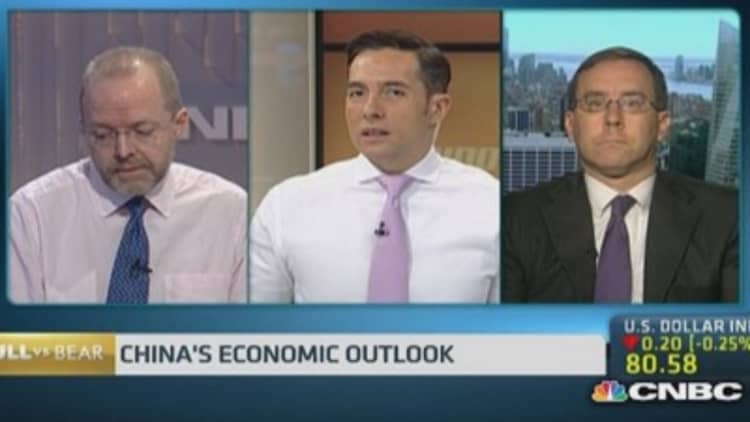
China property vacancies have climbed to more than 20 percent of sold units, fresh data show, but analysts remain divided on whether a real estate crash is in the offing.
The numbers are high, with around 22.4 percent of sold residential homes in urban areas sitting empty in 2013, or a total of 49 million homes, while the number of unsold units is estimated at 3.5 million units, according to the Survey and Research Center for China Household Finance.
But regionally, second and third-tier cities have a vacancy rate of 27.6 percent each, 9.2 percent higher than the larger first-tier cities, the data show.
"The issue with the property sector, which a lot of people are getting very worried about, is more a question not so much of oversupply as the fact that they've been building the units in the wrong place," Stephen Davies, CEO of Javelin Wealth Management, told CNBC.
Read More China property bubble popping? Not so fast
China's planned reforms of property ownership and migration rules will mean "more properties being built in the places people actually want to live," he added.
The latest data appear more dire than a CLSA survey published in May which found a 15 percent vacancy rate for properties completed over the past five years, for a total of 10.2 million empty units, with vacancies in tier-one cities at a healthy 10 percent, while tier-two and tier-three cities had rates around 13-17 percent. Projects completed in 2007-08 were only about 8.6 percent vacant, CLSA said.
China's tier system ranks cities on their population size, services standards and stage of infrastructure.
Read MoreWho's afraid of China's ghost towns?
The data comparison isn't apples-to-apples as CLSA defined vacancy as completed but unoccupied, without considering whether the property was unsold.
Another reason the vacancy rate may not be a worry: Whether a property is vacant in the first few years after it's sold doesn't indicate it won't ever be occupied.
"It is common to see buyers waiting for more than a year or two to move into their unit," Nicole Wong, an analyst at CLSA, said in the May report. She noted that units in China are typically delivered as bare shells, which take longer to fit out and provide less incentive to rent out due to the high initial costs.
Read More Here's the biggest macro risk China faces
Many buyers also wait for nearby infrastructure, such as roads, to be completed before moving in, to avoid living in a construction zone, she said.
To be sure, there's certainly reason to worry about China's property sector, which analysts estimate makes up as much as 25 percent of the mainland's gross domestic product (GDP).
Revenue from property sales for the January-to-May period dropped 8.5 percent on year, while data from Chinese real estate website Soufun show May land sales fell 45 percent on year and transaction value fell 38 percent.

Read MoreIs China loosening its grip on the property market?
"The assumption of ever-rising property prices is what underlies almost all the credit in the Chinese system," Patrick Chovanec, chief strategist at Silvercrest Asset Management, told CNBC.
When property prices flatten or fall, "you really have a cratering effect on the whole economy," he said. "A deleveraging where a virtuous cycle of ever rising property cycles generating more lending turns into a very difficult cycle of deleveraging."
Overall credit growth of less than 20 percent on year is generally a trigger for the property market to unravel, he said.
Data released Thursday show China's total social financing for May grew around 15.7 percent from a year earlier.
—By CNBC.Com's Leslie Shaffer; Follow her on Twitter @LeslieShaffer1

